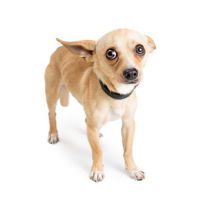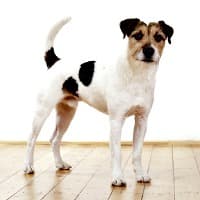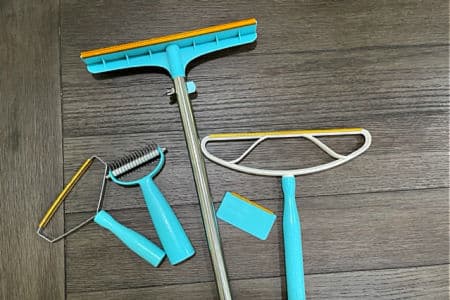FYI: If you buy something through a link on this site I may earn a commission - at NO extra cost to you.
Dog Noise Anxiety
Dog noise anxiety can happen in response to any type of loud noise including fireworks, thunderstorms, gunshots, sirens, alarms, electronic noises, car horns, vacuum cleaners, and more.
The level of fear a dog feels/shows can vary from mild nervousness to outright panic... and everything in between.
There are literally millions of dogs in the US who suffer from some degree of noise anxiety, and their owners suffer too because it's horrible to see your pet so scared.
Dog noise anxiety can gradually become worse over time if it's not addressed/treated, even developing into a phobia.
A dog with noise phobia may start out being scared of one noise, say thunder, but over time the phobia spreads to other loud noises until he's jumping at every sound. Not a fun way to live at all.
There are some things you can do to help your dog if he has a fear of loud noises, and the sooner you start the better.
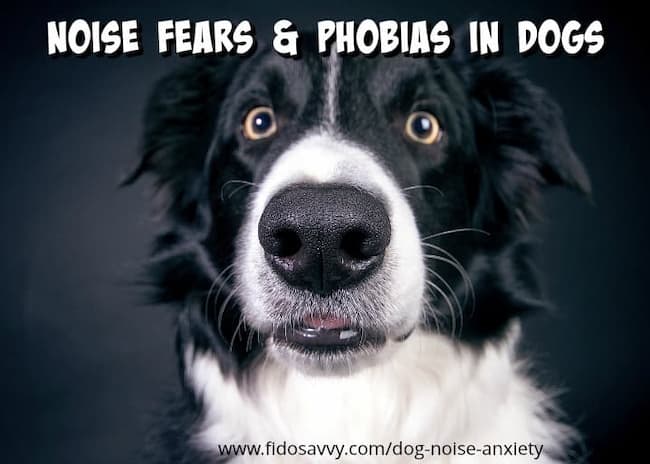
Causes of Dog Noise Anxiety
A dog's fear of loud noises can be caused by several different things.
Firstly, it's actually a normal reaction to be scared of something that we don't understand, or to jump at a sudden loud, and unexpected, noise.
Dogs don't understand what thunder is, why fireworks are lighting up the sky or why the monster with the loud scary voice (aka the vacuum cleaner) is rampaging through their house.
But not all dogs are afraid of loud noises.
Individual temperament plays a part. So does genetics.
If a dog has a pronounced fear (or phobia) of loud noises then it's likely that puppies that he/she has may also have the same fear.
Not all puppies, but some. Genetics is a bit of a lottery that way.
Proper socialization as a young puppy also plays a role in how confident (or fearful) a dog that pup grows up to be.
Puppies who are not exposed to a wide range of people, pets, experiences and environments are often more anxious and fearful in general as they never got a chance to build up any self-confidence outside of their every day environment/routine.
Sometimes a fear is triggered by a stressful or unpleasant experience.
Anything linked (in the dog's brain) to this experience becomes something he may be afraid of in the future. Perhaps for life.
Phobias can be born this way.
Anxiety, Fear and Phobias.... how they're different
There is a difference between anxiety, fear and a phobia.
The dictionary definition of each is:
Anxiety: A persistent feeling of worry or unease about something that may not have happened yet, or has an uncertain outcome.
Fear: An unpleasant emotion caused by the threat of danger, pain or harm
Phobia: An extreme, or irrational fear of, or aversion to, something
Dogs from the herding breeds are more likely to be scared of loud noises than others. It'scan be a genetic, breed-specific trait seen in breeds which include...
- Australian Shepherd
- Border Collie
- German Shepherd
- Golden Retriever
- Old English Sheepdog
- Pembroke Welsh Corgi (originally bred to herd cattle)
- Shetland Sheepdog
Some of these breeds can to be above-averagely reactive, high-energy, super-smart and with a tendency towards being nervous.
Other anxiety-related behaviors such as severe separation anxiety or obsessive compulsive behaviors such as circling or tail-chasing can also more common in these breeds.
Dogs who are truly phobic (rather than just anxious) about one thing may also have over-reactions to others.
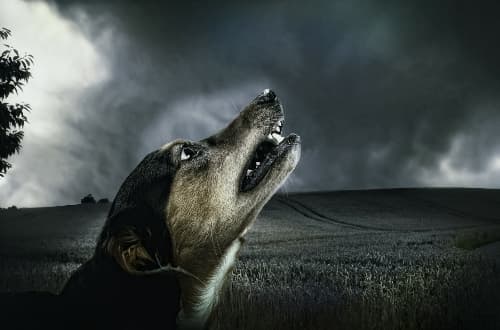
Older dogs can tend to be more anxious in general and can begin to be afraid of things that didn't bother them when they were younger.
Failing eyesight and/or hearing or a decline in robust physical health contributes to this as the world becomes a more difficult place to negotiate.
A dog who is in pain or distress due to a physical condition, or another emotional one, is likely to be more reactive to any type of stimulus, including noise.
So, if your dog isn't feeling well, is recovering from surgery or a upsetting experience, or is anxious due to changes in his life, then he is more likely to show signs of noise anxiety or fear.
Dog Noise Anxiety Symptoms
The signs that your dog is afraid of thunder, scared of fireworks, or generally anxious about loud noises can be very varied.
All dogs are different, and they can react differently to the same types of fears. The signs your dog shows will also vary depending on the degree of his fear, for example anxiety will produce a much less severe reaction than a phobia.
Common Symptoms of Noise Anxiety in Dogs
Here are the most common signs of fear in dogs.
- Shaking, trembling
- Clingy, velcro-dog behavior
- Panting, yawing, drooling
- Pacing
- Tail down, ears back, eyes wide
- Hiding or trying to escape/run away
- Cowering, inability to move, catatonic
- Whining, barking, howling
- Chewing, digging, scratching and destructive behavior
- Loss of bladder and/or bowel control
Your dog may show one or two of these, or most of them.
A dog who is anxious or mildly fearful may simply be more clingy than usual, shake or tremble and whine from time to time.
A dog who has a noise phobia may run around frantically, drool excessively, lose control of his bodily functions and be so desperate to escape the noise that he breaks a window or destroys the door.
Dog Noise Anxiety Treatment
Treating dog noise anxiety involves a two-pronged approach: comfort and desensitization.
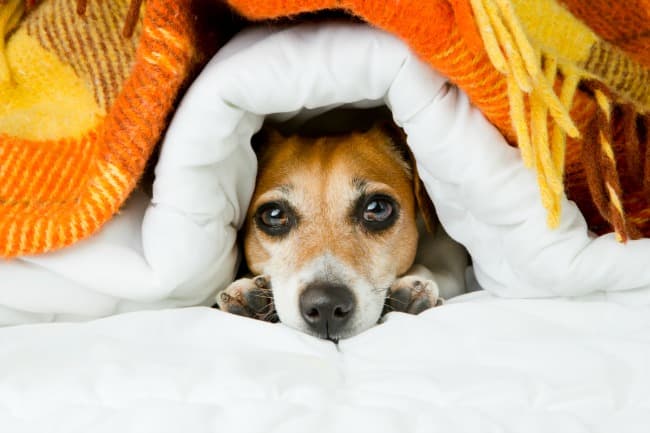
Comfort involves managing your dogs noise anxiety so that you can reduce his fearful reactions and help him to feel less scared.
Desensitization can help your dog to overcome, and eventually eliminate, those fears by gradually exposing him to the thing/s by combining his exposure to the things he's scared of with enjoyable experiences/rewards.
Comforting a dog with noise anxiety
Because every single dog is different in the way that they show their fear and what they seek out for comfort, there's no one-size-fits-all method of comforting a dog with noise anxiety.
You'll need to watch Fido and see what he does to try to comfort himself first.
- Does he cling to you? Want to be loved on and reassured?
- Does he run to his crate or dog bed.
- Does he crawl under the bed, or try to get to the back of a closet?
- Does he cry or howl, chew, dig or run around frantically?
Each of these reactions helps you see what sort of comfort your dog naturally searches for in order to feel less scared.
Here's what you can do to help him get the maximum comfort that works for him.
Give him love and attention
If being close to you and being petted is what your dog craves to feel safe when he's scared, then that's what you need to allow him to have.
But this can backfire if you comfort him in a way which reinforces his fear rather than reduces it.
When you're trying to comfort a dog with noise anxiety, don't use a 'baby' voice or act as though he has a reason to be scared.
Don't hug him tight and croon - "Oh poor Fido, I'm so sorry that bad thunder is scaring you". Instead, use a bright, upbeat voice and a very matter-of-fact approach.
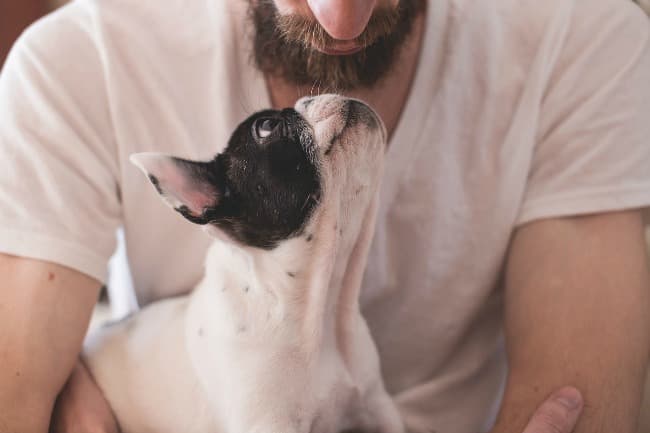
Try saying something along the lines of - "I'm sorry you're scared but everything is fine, let's sit on the sofa and watch TV together."
Do you see the difference? Try it, use both voices and sets of words and you'll understand what I mean.
Distraction is important. Try to take his mind off whatever is causing Fido to be scared.
Let him chew a Kong filled with his favorite treat/s or a tasty bone that he only gets on special occasions right next to you. Or maybe a game of hide-and-seek or an interactive game or puzzle. Getting special time with you will be a treat for him
Obviously this only works for dogs who are anxious or a little fearful, outright terror or phobia does not respond to logic as it's a primitive fear-based behavior.
Help him find his 'safe spot'
Sometimes dog noise anxiety can make Fido run and hide in the smallest, darkest place he can find... or in a spot where he feels safest.
This might be his crate (if so, throwing a light blanket over it can make him feel even safer), or under a bed or table. It might even be in a closet or the smallest bathroom. Your dog knows what he needs so it's best to let him hide wherever he feels most comfortable.
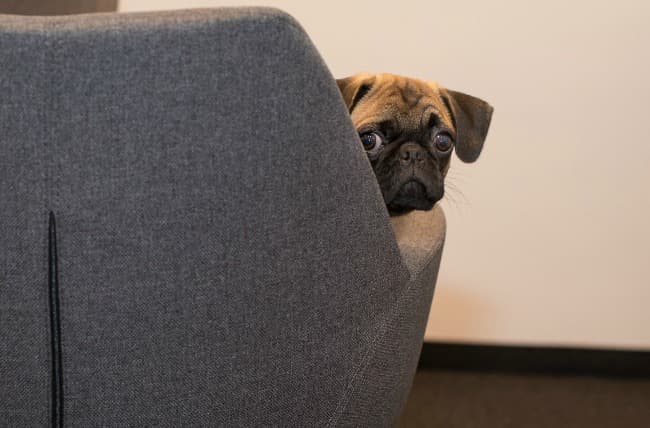
If getting to his safe spot makes him less fearful then all you need to do is make that spot as comfy as possible and most likely leave him alone.
Some dogs feel better with their owner right next to them. Others prefer to be alone. You'll know which your dog wants.
Try to find out whether your dog feels best in the dark, or the light, or maybe a low-wattage table lamp or night light is what he's most comfortable with.
Sometimes putting cotton wool balls in your dog's ears can help muffle the loud noises he's so scared of.
Products that can help reduce dog noise anxiety
There are many different products that can help dogs who are suffering from noise anxiety. These include natural remedies and supplements, physical products and anti-anxiety medications.
Natural remedies for dog noise anxiety
Pheromone Products use naturally-derived pheromone scents to help calm anxious dogs and puppies.
They're available as collars, room diffusers and sprays.
The positives are that pheromone products are totally natural, have no side-effects and can be extremely effective for small - medium sized dogs and puppies.
The negatives are that it's not an 'instant fix', pheromone products often take between 12 and 36 hours to start being effective, and that for larger dogs a collar alone may not be enough.
However if your dog hates fireworks, then it's a great idea to set up a pheromone diffuser in the room where his crate (or safe-spot) is and to put a pheromone collar on him several days before fireworks are about to start up.
Other natural remedies/products which help reduce anxiety and have a calming effect include Jacksons Galaxy Stress Stopper, Bach Rescue Remedy for Pets, Hemp Calming Aid Chews and HomeoPet Storm Stress for Dogs.
physical products for dog noise anxiety
Wraps, t-shirts or coats which are designed to apply gentle, calming pressure to your dog's body. These work on the same principal as swaddling a baby and there are several to choose from.
The most well-known brand is the Thundershirt.
The American Kennel Club also offer their AKC Anti-Anxiety and Stress Relief Calming Coat and there's the Pet Adjustable Anti-Anxiety Wrap & Calming Coat.
Then there's music, which can be as calming for dogs as it is for people.
Classical or meditation type soundtracks have proven to be effective at reducing stress in dogs and there are several CD's available that have been designed especially for our canine companions.
You can find a selection of these on this page Dog Relaxation CD's.
Dog noise anxiety medication options include:
dog noise anxiety medication

Sileo is the very first FDA-approved medication for dogs who suffer from noise anxiety. This breakthrough medication was released in 2016 and works by blocking the brain chemical Norepinephrine (similar to adrenaline).
Stressful situations cause the body to produce high levels of Norepinephrine in order to mobilize the fight-or-flight mechanism and these high levels cause anxiety symptoms and reactions.
During tests and evaluation Sileo was said to be 'impressive' and reduces anxiety without sedating your dog so he'll act normally but not feel scared.
Easy to adminster gel form and is effective for up to three hours with very few side-effects.
Your veterinarian can prescribe Sileo for dog noise anxiety and you may find it cheaper to buy Sileo online. It's always worth checking.
Another medication that your vet may prescribe isClomicalm. It's usually used to treat separation anxiety in dogs but can also be used to treat dog noise anxiety issues.
Other medications often used to treat dog noise anxiety include human medicines such as Xanax, Prozac and such.
You can learn more about giving these to your dog here Dog Safe Human Medications.
Dog noise anxiety desensitization
Desensitization can be tricky to undertake and because of the way it works there is the potential of making things worse rather than better.
But if you do it right you can actually remove your dogs fear of loud noises rather than just manage them (as you're doing with the comfort options above).
In my personal opinion if Fido has severe dog noise anxiety or a phobia of loud noises then it's worth the effort, and risk, to try it.
How to desensitize a dog with noise anxiety or phobia
First of all you'll need a CD or audio-recording of the specific noise/s that scare your dog.
You can find these online pretty easily, even for things such as gun-shots, traffic backfires and so on.
Choose a time when your dog is quiet and calm and start out by playing the CD for him at a volume which is low enough not to scare him.
Dogs have very sensitive ears so the volume you need may be lower than you would expect.
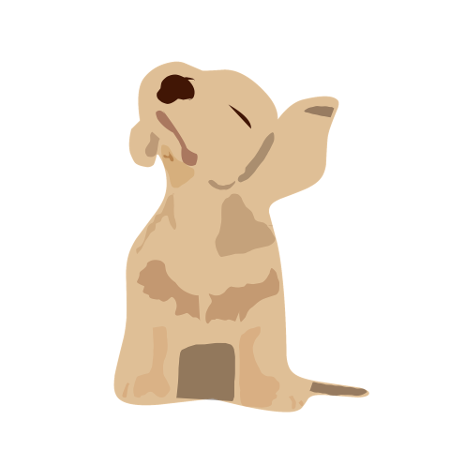
Play the CD for maybe 10 minutes or so, then turn it off and reward Fido with a favorite treat (or two) for staying calm.
Do this for around 5 days or so, then on the 6th day increase the volume a little, still within the range that is comfortable for him.
Repeat the cycle, then repeat it again, and again...
Over a period of a few weeks (or possibly months depending on how anxious he is) of raising the volume a little every 4 or 5 days and rewarding him with a super-tasty treats you should be able to get him to tolerate the noise that previously terrified him.
It's important to move at your dog's pace and not to scare him.
Never force him to listen at a volume that makes him anxious, even if it takes two weeks to move up a couple of notches.
If he ever starts to show fear, reduce the volume again and then only start increasing it once he's totally comfortable again.
You want to be able to get him to a point where he's no longer afraid at his own pace.
If he's exposed to the noise that scares him during that time it could hinder his progress, even put you back at square one.
So, if it's a fear of thunderstorms that your dog suffers from, try to desensitize him prior to thunderstorm season (usually this is during Spring and Fall).
If it's fireworks that he's afraid of, use the periods between New Year and July 4th (either side) to work on his desensitization.
If your dog's noise fears of phobia are very severe, or you find that your attempts to desensitize him are not working - or making things worse - I'd recommend finding an animal behaviorist to help you.
Your veterinarian or a local dog obedience school/trainer may be able to give you recommendations.
Or you can check out this directory to see if there is a Certified Applied Animal Behaviorist (CAAB) in your area - Animal Behavior Society CAAB Directory
you might also like...
FTC Disclosure: Some pages on this site contain affiliate links. I may earn on qualified purchases.
